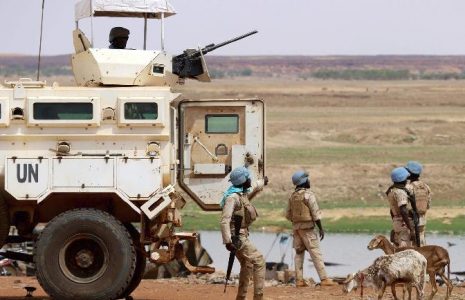
Militants linked with al-Qaeda and ISIS can still strike hard in Mali
A deadly attack on a remote military outpost in Mali has highlighted the resilience of Islamist fighters across huge stretches of Africa, even as President Trump boasts of the defeat of Islamic State forces in other parts of the world.
At least 53 soldiers and one civilian were killed Friday when militants attacked the outpost near Mali’s border with Niger.
It is one of the deadliest attacks against Malian forces and a bloody reminder that militants linked with al-Qaeda and the Islamic State in Mali are working to gain ground in the region, experts say.
Many factors driving the rise of these militants — grinding poverty, government neglect, pervasive insecurity and exploitation of ethnic differences — are similar to what enabled the Islamic State in 2014 to amass a statelike apparatus in Iraq and Syria until U.S.-backed Iraqi and Syrian forces pushed them out in 2017. And the absence of adequately addressing these concerns, experts say, is also what’s helping to drive their regrouping in West Africa and beyond.
What’s been happening in Mali?
Mali is a sprawling country twice the size of Texas and neighbors seven countries with porous borders. It is in the region of Africa known as the Sahel, an extremely arid area stretching from one shore of the continent to the other.
In 2012, Islamist militants overran northern Mali and seized control. They were pushed out a year later by Malian forces backed by the French (who previously colonized the country). Only that didn’t end the conflict. Since then, insecurity has continued to reign, while militant attacks have spread to other parts of Mali and to neighboring countries.
“The government lacks the manpower to cover its territory, and many civilians have lost confidence in government troops amid accusations that they have killed villagers suspected of terrorist activity without giving them a fair trial,” Siobhán O’Grady of The Washington Post reported earlier this year. “Such abuses outrage communities and can drive more people into the ranks of the extremists, human rights experts warn.”
No group immediately took responsibility for Friday’s assault, which the Malian army called a “terrorist attack.” In September, another assault on Malian forces killed about 40 soldiers at two military outposts near the border with Burkina Faso.
What’s different this time?
In recent months, Islamist militants in Mali have been employing a new tactic to extend their control: trying to divide and conquer between ethnic groups.
As Danielle Paquette of The Post reported from Mali in October, “Islamist militants who once tried to conquer Mali by force are striking again with an insidious new strategy, security analysts say: Fighters linked to al-Qaeda and the Islamic State are provoking feuds between old neighbors — the Fulani and the Dogon — and gaining ground by offering to protect victims of the conflict they’re stoking.”
Malians caught in the crossfire, meanwhile, are fleeing their homes at record numbers: 140,000 people were displaced this year, a sevenfold increase from the previous 12 months, the Internal Displacement Monitoring Center reported in September. Others don’t make it. Since January, the fighting has killed 817 civilians, up from about 574 in 2018, the Armed Conflict Location & Event Data Project reported.
Where else is the violence reaching?
Events in Mali are having major regionwide implications, Paquette reported. “Chaos has spilled south into countries previously unshaken by terrorism, including Burkina Faso and Benin, and threatens to turn a growing swath of West Africa into a refuge for Islamist groups who have lost territory in Syria and Iraq and aim to rouse followers elsewhere.”
The border between Mali and Burkina Faso is “the latest flash point,” the Associated Press reported at the end of October. In just one week last month, extremists in northern Burkina Faso were suspected of killing at least 19 civilians, according to the AP.
What’s being done to stop the militants?
In 2017, five Sahel-region countries — Burkina Faso, Chad, Mali, Mauritania and Niger — set up a French-backed counterterrorism force. Known as the G5 Sahel force, the soldiers are tasked with increasing security along with United Nations peacekeepers. In turn, both groups have become a target of militants.
Experts warn that security alone won’t stop the insurgents. “Development and better public administration are key — but of course that is hard to provide when government personnel are at risk of targeted killing and it is not safe for development agencies to operate,” Paul Melly, a consulting fellow to Chatham House’s Africa Program, told Al Jazeera.
Heavy-handed tactics to quell the violence in Burkina Faso and Mali could drive some toward extremism, the AP reported. Since 2017, Burkina Faso forces have executed at least 200 civilians suspected of helping extremists, Human Rights Watch found.
In April, Mali’s Prime Minister Soumeylou Boubèye Maïga and his entire government resigned over public frustration with their failure to quell violence.
Before he resigned, Maïga warned “that a weakened Islamic State in Iraq and Syria could prompt fighters to shift their focus to the Sahel, where porous borders and lax security have provided fertile ground for extremist groups,” O’Grady reported.
“The United States should have the same engagement in the Sahel as it does in the Middle East,” Maïga told The Post at the time. “Malian security is the essential key to international security.”
Source: Washington Post





